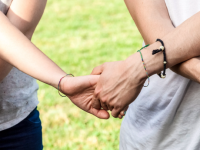When Students Reflect on Group Participation and Social-Emotional Goals
Students, especially those experiencing personal and academic stress, benefit from reflection opportunities and chances to participate in school in positive and productive ways. In their book, Social and Emotional Education in Primary School: Integrating Theory and Research into Practice, Carmel Cefai and Valeria Cavioni have excellent ideas about how to help students have a better social-emotional learning experience during the school day.
Reflection on Constructive Group Participation
Helping students understand that much of what they do in life -- academic, social, civic, vocational, and recreational -- involves working in groups. What makes for constructive group participation? Encourage your students to rate and/or reflect on the following questions, each of which describes an important element of successful group participation.
Help your students to identify their strengths and focus on an area of improvement. Have them buddy up to work on those areas. Consider students' skills in these areas when forming them into groups:
Rating: 1(rarely true), 2 (occasionally true), 3 (frequently true), 4 (almost always true).
- I am able to identify and communicate how I am feeling.
- I can appropriately handle my feelings.
- I can set and achieve goals that will make me more successful.
- I am able to keep going in the face of difficulties and setbacks.
- I can reflect on my thinking and learning.
- I am aware of the feelings and opinions of others.
- I care about others and do my part to make my school/group better.
- I care about and respect the individual differences of others.
- I am aware of how I perceive others and how they perceive me.
- I will interact appropriately with others.
- I will work on having positive and caring relationships.
- I will collaborate with others in learning and social activities.
- I will learn to handle conflicts in constructive ways.
- I will act in an honest and responsible way with others.
- When making decisions, I will consider the needs and rights of others.
Setting Personal Social-Emotional Goals
As part of a reflection journal (see section below), or morning meeting, advisory, other related activities, or simply within your classes, help students evaluate how things are going and how they can go better. Have students reflect (via writing and/or discussion) on one or more of the following:
- Write one or two things you like about your classroom/group.
- Write one or two things you would like to see happen in your classroom/group.
- Write one or two things that might help you learn better in. . .
- Write one or two things that may help you to behave better in. . .
- Write one or two things you would do when you have problems or conflicts in your group.
- Write one or two ways in which you would include all others in your group.
- Write one or two ways that you give and get support to/from others in your group.
I don't think it takes a great deal of imagination to see the many ways in which these prompts can be used not only to help individual students improve, but to also to provide valuable guidance for making group and classroom time more constructive and satisfying.
Student Social-Emotional Journals
As students focus on specific social-emotional skills or are working on particular character attributes, Carmel and Victoria recommend that they keep a weekly journal. They mention two formats. In the open-ended format, students are asked to document their experiences in getting along with others during the past week.
Among the questions they can reflect on are:
- What they like doing
- What they are good at
- What they have learned
- What they need to learn or develop more
- Where they need more help
- What they are looking forward to in the upcoming week
They can use modalities such as drawing, writing a story, jotting down thoughts and feelings about anecdotes, or using a picture of some kind to represent the past week. Some teachers like to get students started by explicit guiding questions or by using prompts, such as, "One thing that went well with other students this past week was. . ." or " Something I wish went better this week was. . ."
A more structured version is linked to specific social-emotional or character-related lessons or skill building experiences students are receiving. It would begin with whatever the focal skill(s) or character attribute is, and then could follow many of the same guidelines as the open-ended format.
This activity can be completed as part of language arts or art instruction, or during circle/morning meeting/advisory time. Once students complete their individual entry, you can have them discuss their reflections in pairs, small groups, and/or the full group.
Student reflection journals can be shared with parents at parent-teacher conferences. At the end of the year, copies can be sent home with parents, as well as allowed to move on with students as part of their social-emotional and character growth portfolio.
Carmel and Victoria's book is especially strong in providing assessment and benchmarking tools, as noted above, to foster educator and student reflection, denote progress, and help define areas in that would benefit from future attention.
The focus on both individual social-emotional competencies and improved group functioning helps prepare students for the many future contexts in which their success will depend on both.
